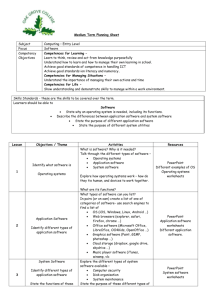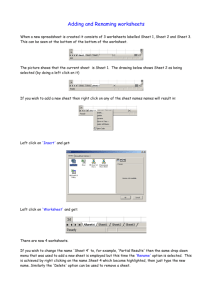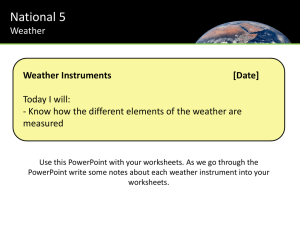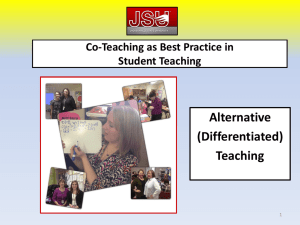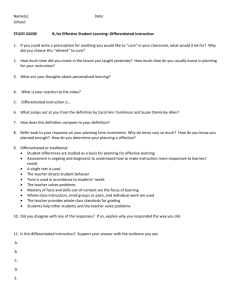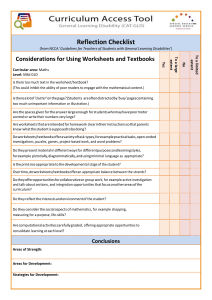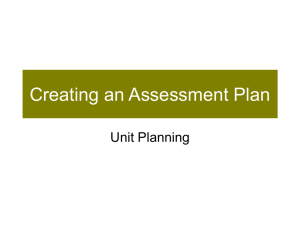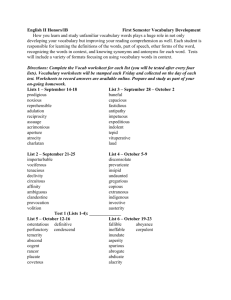unit 2 sow NCFE (new window)
advertisement
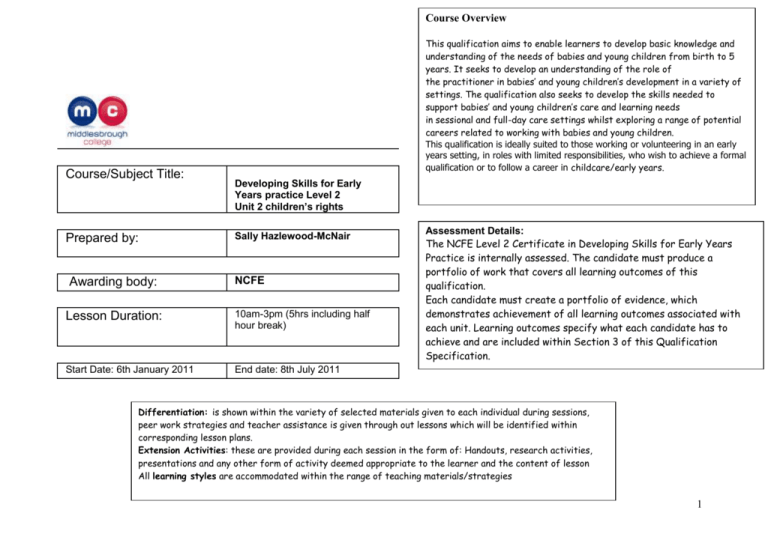
Course Overview Course/Subject Title: Prepared by: Awarding body: This qualification aims to enable learners to develop basic knowledge and understanding of the needs of babies and young children from birth to 5 years. It seeks to develop an understanding of the role of the practitioner in babies’ and young children’s development in a variety of settings. The qualification also seeks to develop the skills needed to support babies’ and young children’s care and learning needs in sessional and full-day care settings whilst exploring a range of potential careers related to working with babies and young children. This qualification is ideally suited to those working or volunteering in an early years setting, in roles with limited responsibilities, who wish to achieve a formal qualification or to follow a career in childcare/early years. Developing Skills for Early Years practice Level 2 Unit 2 children’s rights Sally Hazlewood-McNair NCFE Lesson Duration: 10am-3pm (5hrs including half hour break) Start Date: 6th January 2011 End date: 8th July 2011 Assessment Details: The NCFE Level 2 Certificate in Developing Skills for Early Years Practice is internally assessed. The candidate must produce a portfolio of work that covers all learning outcomes of this qualification. Each candidate must create a portfolio of evidence, which demonstrates achievement of all learning outcomes associated with each unit. Learning outcomes specify what each candidate has to achieve and are included within Section 3 of this Qualification Specification. Differentiation: is shown within the variety of selected materials given to each individual during sessions, peer work strategies and teacher assistance is given through out lessons which will be identified within corresponding lesson plans. Extension Activities: these are provided during each session in the form of: Handouts, research activities, presentations and any other form of activity deemed appropriate to the learner and the content of lesson All learning styles are accommodated within the range of teaching materials/strategies 1 2 Week: 10/02/ 11 Topics to be covered? L.O What will learners do? How will learning be checked? Key/basic skills? What resources are needed What independent learning/homework will be set? Contribute to the provision of equal opportunities for children and young people 1.1 Listen/discuss Observation, Q & A, discussion 1.4 Participate in warm up activity/ discuss last weeks learning, present and discuss completed homework & put into file All areas of the unit are matched to key Skills; English, Maths, IT Planning and Reviewing Problem Solving Working with Others Paper, pens, computer, whiteboard, video/ PowerPoint, handouts, sample policies, leaflets. Craft materials, worksheets To investigate own settings procedures for safeguarding children and confidentiality procedures/discuss in following lesson (intro) •Warm Up •Recap last weeks learning •Homework from last session worksheet (1.1) • What is the UN Convention on the Ri rights of the Child? Watch video & discuss •Thought shower tasks in groups for given situations •Complete worksheet •Presentation of completed work In groups discuss the question above and then answer the following: What rights should children have? Should this be the same for all children? Is it the case for all? Why do some not have such rights? Write answers on post it notes and stick around the whiteboard/feedback Observation, Q & A, completion of worksheet, feedback Observation, differentiated Q & A, completion of worksheet & posters, check responses Observation, differentiated Q & A, completion of activities/ Feedback Observation, differentiated Q & A, completion of worksheets, activities/ Feedback Observation, differentiated Q & A, completion of worksheets, activities/ Feedback 3 Week: 2 17th/02/11 Topics to be covered? L.O •Warm Up •Recap last weeks learning What will learners do? How will learning be checked? Key/basic skills? What resources are needed Participate in warm up activity/ discuss last weeks learning, discuss homework Observation, Q & A, discussion In pairs discuss what safeguarding mean/feedback. Watch/listen to presentation Discuss, Observation, Q & A, completion of task & feedback Paper, pens, computer, whiteboard, video/ PowerPoint, handouts, sample policies, leaflets. Craft materials, worksheets Watch/listen to presentation Small group activities/discussion/ Worksheets Observation, differentiated Q & A, completion of mind map/group tasks All areas of the unit are matched to key Skills; English, Maths, IT Planning and Reviewing Problem Solving Working with Others •Homework from last session 1.7 Read the information provided on the Convention on the Rights of the Child; read each article and annotate where appropriate to show your opinion and make links to practice. 1.8 1.9 Research task In groups using the internet research the rights of children and create a PowerPoint presentation to show the whole class: stating 3 articles taken from the convention on children’s rights, that you think are the most important and say why You will give feedback to each group regarding their What independent learning/homework will be set? Observation, differentiated Q & A, completion of case studies Feedback Observation, differentiated Q & A, completion of worksheets, activities/ Feedback 4 presentations Week: 3 24th/02/11 Topics to be covered? L.O What will learners do? How will learning be checked? Key/basic skills? What resources are needed •Warm Up •Recap last weeks learning Participate in warm up activity/ discuss last weeks learning, discuss homework Observation, Q & A, discussion Introduce this weeks topics *Discrimination Watch/listen to presentation In pairs complete a mind map ‘what is discrimination’ & feedback. Paper, pens, computer, whiteboard, video/ PowerPoint, handouts, sample policies, leaflets. Craft materials, worksheets *What is indirect discrimination Watch/listen to presentation Small group activities/discussion/use LRC to research this subject create PowerPoint presentations/ feedback/discuss complete worksheets Observation, differentiated Q & A, completion of mind map/group tasks, individual responses All areas of the unit are matched to key Skills; English, Maths, IT Planning and Reviewing Problem Solving Working with Others *What is direct discrimination How does discrimination impact on a child’s development Small group discussion, complete case studies, present findings Group discussions/ answer questions on worksheet/feedback What independent learning/homework will be set? Observation, differentiated Q & A, completion of presentations Feedback of individual responses Observation, differentiated Q & A, completion of case studies worksheets, activities/ Feedback 5 Week: 4 03/03/11 Topics to be covered? L.O •Warm Up •Recap last weeks learning What will learners do? How will learning be checked? Key/basic skills? What resources are needed Participate in warm up activity/ discuss last weeks learning, discuss homework Observation, Q & A, discussion All areas of the unit are matched to key Skills; English, Maths, IT Planning and Reviewing Problem Solving Working with Others Paper, pens, computer, whiteboard, video/ PowerPoint, handouts, sample policies, leaflets. Craft materials, worksheets Introduce this weeks topics • The Importance of Settings having Equal Opportunities, Anti Discriminatory and/or Inclusion Policies 1.6 Listen and participate in discussions Watch PowerPoint & videos ‘ Small group discussions & feedback Thunder shower task in groups ‘what policies are there in your setting for equal ops and inclusion Complete case studies & present findings Use Internet to research inclusive practice & create presentation/present to class Watch presentations, complete sorting activity in small groups, Small group activities /discussion/use LRC to research this subject create PowerPoint presentations/ feedback/discuss complete worksheets Observation, differentiated Q & A, completion of mind map/group tasks, individual responses What independent learning/homework will be set? Observation, differentiated Q & A, completion of presentations Feedback of individual responses Observation, differentiated Q & A, completion of sorting task worksheets, activities/ Feedback 6 Watch/listen to presentation & watch NSPCC videos Small group discussion, complete case studies, present findings Week: 6 17th/03/11 Topics to be covered? •Warm Up •Recap last weeks learning This weeks topic: * Individual needs of children L.O Observation, differentiated Q & A, completion of case studies worksheets, activities/ Feedback What will learners do? How will learning be checked? Key/basic skills? What resources are needed Participate in warm up activity/ discuss last weeks learning, discuss homework Observation, Q & A, discussion Listen and participate in discussions Observation, differentiated Q & A, completion of mind map/group tasks, individual responses All areas of the unit are matched to key Skills; English, Maths, IT Planning and Reviewing Problem Solving Working with Others Paper, pens, computer, whiteboard, video/ PowerPoint, handouts, sample policies, leaflets. Craft materials, worksheets Watch PowerPoint & videos worksheets/feedback, in group’s list possible hazards indoor/outdoor and how they can be minimised. Discuss children’s needs and create a poster depicting individual needs and What independent learning/homework will be set? Observation, differentiated Q & A, completion of presentations Feedback of individual responses Group activities ‘ how settings can promote inclusion’ Observation, 7 * Recap unit 2 and completion of all work. * Discuss unit 3 Create a policy for a Childs setting on inclusive practice, research subject using text books, watch presentation & videos & discuss Complete worksheet differentiated Q & A, completion of sorting task worksheets, activities/ Feedback Complete quiz, feedback answers; participate in workshop session to ensure that all unit 2 work is complete. Observation, differentiated Q & A, Feedback Watch presentation, feedback to whole class for discussion Observation, differentiated Q & A, Feedback 8 9
